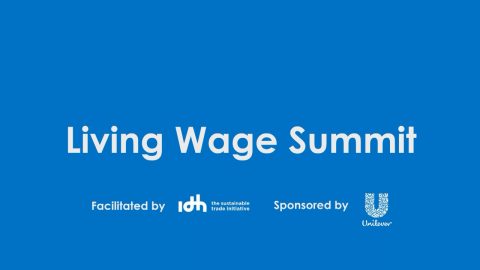Economic inequality is one of the biggest threats that the world currently faces. Now is the time to tackle this difficult topic and break the cycle of poverty. A critical step is to secure living wages for workers.
During the Living Wage Summit 2021 we examined the broader context of poverty, economic inequality and how living wages can help companies contribute to reducing inequality with actions and solutions. It was a jampacked event with a diverse range of speakers.

Recap of the 2021 Living Wage Summit
Daan Wensing, CEO at IDH opened the event with a call to action for all companies to start making the move towards a living wage.
This introduction was complemented by Marc Engel, Chief Supply Chain Officer at Unilever, who took the opportunity to emphasize Unilever’s living wage commitment, stating that living wages should be understood not as a cost, but instead as a business opportunity. Like Daan Wensing, Marc Engel put urgency on now being the opportune moment to act: “There is no better time than now. You cannot have a healthy business without a healthy society.”
Dr Dhananjayan Sriskandarajah, CEO at Oxfam GB, reflected on the pandemics’ ability to reveal deep inequalities within our current supply chain system and that this could be a catalyst for change. “If we see the pandemic as the big disruptor hopefully this is the critical moment in which businesses say its deeply unsustainable to keep these inequalities within our supply chain system.”
A panel discussion followed on the challenges companies face in order to address living wages and what solutions are available, made up by: Marcela Manubens, Global VP Integrated Social Sustainability at Unilever, Volkert Engelsman, CEO at Eosta, Alex Katz, Senior Manager, Supply Chain Social Responsibility at Patagonia and Giles Bolton, Responsible Sourcing Director at Tesco. Key solutions were collaboration, long-term commitments, empowering and trusting growers and a push to simply start taking the first steps of action now.
On government action for living wages, Birgitta Tazelaar, Deputy Director General International Cooperation for The Dutch Ministry of Foreign Affairs emphasized the need for governments to partner with companies on this issue, using a “smart mix of government measures”. Lisa Kirfel-Rühle, Deputy Head at the German Federal Ministry for Economic Cooperation and Development (BMZ) agreed explaining the use of a smart mix of legislative and non-legislative trade rules.
Sharan Burrow, General Secretary, International Trade Union Confederation (ITUC) represented trade unions and stressed that there must be a will to share prosperity and to put your business under a responsible conduct basis.
The second half of the event focused on practical tools available for living wages. Jordy van Honk, Global Director at IDH shared information on practical tools that are available for those who want to work towards a living wage: the IDH Living Wage Roadmap.
Watch Jordy’s explanation on the Roadmap here:

Julie Cournoyer, Director Global Sustainability at Fyffes and Jennifer Muller, Sustainability Manager at CBL (Dutch Food Retail Association) gave practical examples of how they used tools and calculated the size of the gap and found solutions.
Just as the Living Wage Summit opened with the call to action, it also closed with urging all companies to join in taking action.



